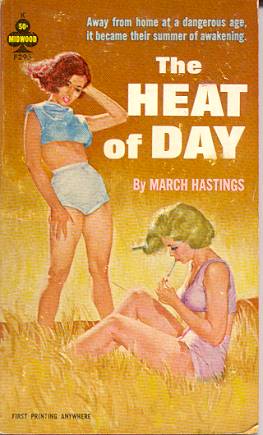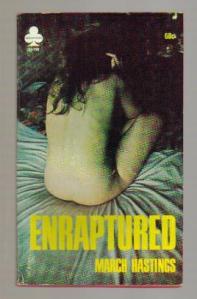
Sin Girls is Nightstand #1514, the 13th book William Hamling published in early 1960, written by Robert Silbverberg. Seems Hamling wanted a female pen name. The second Marlene Longman, however, Lesbian Love, was penned by Marion Zimmer Bradley, and tends to be pricey among colletors, up to $200 as seen here.

Harlan Ellison wrote the purple prose cover copy, and I am sure he had a laugh when composing this:
This is the most powerful novel you will ever read on the subject [lesbian desire], written by a woman who is, hersefl, A TORMENTED LESBIAN!
Robert Silverberg: tormented lesbian!! At the Silverberg Yahoo Fan Group, Silverberg himself commented: “That blrub is incorrect…I was the happiest of lesbians.”
Sin Girls is the story of Leslie — nice pun there, and one woman says, “Hey, that’s a man’s name!” It opens with Leslie awakened by a nightmare she has every night, remembering the man who raped her when she was a teenager, taking her virginity violently. She is in bed with a one-night stand in a hotel that caters to lesbians looking for intimate encounters. In the morning, the other woman says how much fun she had and hopes they will hook up again, but Leslie informs her that she only has one-nighters: no emotional entanglements, no names if she can help it.
Leslie is cold-hearted, seeking only physical relief. It’s a front. We find out she was not always that way; she has become distant and aloof from a scarred heart broken too many times. First, there was the rape, and her boyfriend’s not wanting anything to do with her after (similar to the set-up of Connie by Silverberg’s Loren Beachamp). The rape left her afraid of men, so she turns to women — the common lesbian element (along with a bad loveless marriage and incest) in lesbian pulp fiction by men, sometimes women (March Hastings).
Her first serious lesbian affair is with Laura, a woman 10 years her senior. They live together in what seems like dyke bliss. Then Leslie has an affair with another young lesbian in Laura’s gay social cirle (with a lot of bull dykes and beanik queers), they get caught, and Leslie gets tossed out on the street.
She later moves in with three teenage girls who dress in leather jackets and jeans. They have orgies every night, doing round-robin pussy eating, etc. (although not decribed as crudely, of course). She finds the girls too cruel and sadistic to other people and leaves. She has a series of short flings, the crosses paths with an older woman who runs an escort agency that caters to rich lesbian women. Leslie is a gay call for a year, traveling all over the world with herisess and widowed dykes.
While in the Caribbean with a woman who likes to be whipped and flogged before sex, Leslie meets a young college football hero on vacation and falls in love. She is “weary” of lesbian sex and wants something different. She denounces her gayness and goes straight, intending on marriage, ending thus:
All that mattered was that the long nightmare was over, that she lay with a man and that with each move of his body he brought her closer to fulfillment, and that she was forgiven and that the bright sun now rising overthe Caribbean heralded a bright new day, a brand new life just beginning… (p. 191)
This was typical of lesbian fiction — in order to not face obscenity charges, lesbianism was treated as a deviant disease, and the lesbian could not find happiness in the end with a same-sex partner — she had to either come to a horrible conclusion for her unnatural sins or repent her evil ways and find truth and beauty in the arms of an Alpha Male with a nivce big hard dick that provides “fulfillment.” The nightmare here is Leslie’s years of lesbiana, and she is “forgiven” of such horrors by going to a man for salvation.
This also happens in Silverberg’s other lesbian novel from 1959, Twisted Loves by Mark Ryan, that I previously discussed.
Let us not cry homophobia today — this was a market demand and condition of the times, when being gay was “strange” (hence “queer” later on), referred to as “twilight women” and “the third sex” engaging in “the third theme” or walking down “the 3rd street.”
There were some other Silverberg lesbiana tales from Cornith/Greenleaf, like Flesh Boarder and The Initiates, with lesbian encounters in many other books, like Party Girl, Fires Within, Wayward Widow, etc. Silverberg’s lesbians always look the same: mannish,smal breasts, short dark hair. In two books, the same dyke shows up who writes children’s books as a profession.

There is also Diary of a Dyke, a 1966 title from Cornith’s Pleasure Reader series, from Phenix Publications, one of the many shell companies Hamling used to keep the feds scrambling. (Sorry, no cover scan). Diary of a Dyke is a journal over 3 months as a woman who likes sex with girls tries to denounce her gayness by sleeping with a lot of men, but she still prefers girls. It’s a funny book, and at first I did not think Silverberg wrote it — in “My Life as a Pornographer,” he states he stopped writing softcore sleaze in 1964-5, yet there are many 1966-7 Don Elliots, either books that were in a pipeline or Silverberg just stopped his two-novels a month output but still penned the cccasional smut book for money or a need to whip one out. Silberberg says no other writer used the Don Elliott name the way others did with J.X. Williams, Andrew Shaw, and Don Holliday.
 There is also the bogus case study “non-fiction” book Twilight Women by L.T. Woodward, M.D., a pseudonym Silverberg used for a dozen books from Monarch Books, Lancer, and Belmont. This one, like the other Woowards, is really a collection of short stories made to look like a doctr’s case histories of patients he has treated — in this case, women who are lesbians and need to be cured. Each story delves into the why and how each woman went gay, or is bi.
There is also the bogus case study “non-fiction” book Twilight Women by L.T. Woodward, M.D., a pseudonym Silverberg used for a dozen books from Monarch Books, Lancer, and Belmont. This one, like the other Woowards, is really a collection of short stories made to look like a doctr’s case histories of patients he has treated — in this case, women who are lesbians and need to be cured. Each story delves into the why and how each woman went gay, or is bi.
I plan to devote a long blog, and a whole acadmeic essay, on the many faux sexology books published in the 60s, riding the tail of the success of the Kisney and Masters and Johnsons Reports, quetsioning the ethics of such, and whether or not such presentations of fiction as fact was “dangerous” or irresponsible — but hey, where there is a market…
…plus, I have done the same with my Dr. Mundinger-Klow titles for Olympia Press, so, er. um…..!
I have a huge stack of lesbian sleaze here that I will blog about over the next two months — Lawrence Block published a lot of lesbiana as Sheldon Lord, Dr. Benjamin Morse, Lesley Evams and Jill Emerson (his first sale was a lesbian book to Beacon in 1958, and many of his Midwoods had lesbian themes). And I have lez books by real gay women like Randy Salem, March Hastings, Vin Packer, as well as William Coons’ pen name, Barbara Brooks.








![Photo0589[1]](https://vintagesleazepaperbacks.files.wordpress.com/2011/12/photo05891-e1323674890782.jpg?w=225&h=300) I have enjoyed all the March Hastings books I have read so far, such as The Drifter and others. Anybody’s Girl is a decent, albeit predictable read about sexual confusion.
I have enjoyed all the March Hastings books I have read so far, such as The Drifter and others. Anybody’s Girl is a decent, albeit predictable read about sexual confusion.











 There is also the bogus case study “non-fiction” book Twilight Women by L.T. Woodward, M.D., a pseudonym Silverberg used for a dozen books from Monarch Books, Lancer, and Belmont. This one, like the other Woowards, is really a collection of short stories made to look like a doctr’s case histories of patients he has treated — in this case, women who are lesbians and need to be cured. Each story delves into the why and how each woman went gay, or is bi.
There is also the bogus case study “non-fiction” book Twilight Women by L.T. Woodward, M.D., a pseudonym Silverberg used for a dozen books from Monarch Books, Lancer, and Belmont. This one, like the other Woowards, is really a collection of short stories made to look like a doctr’s case histories of patients he has treated — in this case, women who are lesbians and need to be cured. Each story delves into the why and how each woman went gay, or is bi.









 For collectors, Hastings’ Her Private Hell is always priced around $100 of more, mainly for the Paul Rader cover, but Rader did many of her books, such as the first edition of The Drifter (above). The second edition has a photo-cover of a woman next to a piano player, with a jazzy slum feel — I prefer the Rader cover (beats me why Midwood would change a great cover to a not-so-great cover).
For collectors, Hastings’ Her Private Hell is always priced around $100 of more, mainly for the Paul Rader cover, but Rader did many of her books, such as the first edition of The Drifter (above). The second edition has a photo-cover of a woman next to a piano player, with a jazzy slum feel — I prefer the Rader cover (beats me why Midwood would change a great cover to a not-so-great cover).












